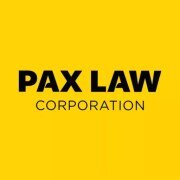Best Communications & Media Law Lawyers in North Vancouver
Share your needs with us, get contacted by law firms.
Free. Takes 2 min.
List of the best lawyers in North Vancouver, Canada
About Communications & Media Law in North Vancouver, Canada:
Communications & Media Law in North Vancouver, Canada encompasses a wide range of legal issues related to the communication and media industries. This area of law covers issues such as freedom of speech, privacy rights, defamation, intellectual property, and more. It is essential to understand the laws and regulations that govern these industries to avoid legal pitfalls.
Why You May Need a Lawyer:
You may need a lawyer specializing in Communications & Media Law in North Vancouver if you are facing legal challenges related to defamation, copyright infringement, privacy violations, or any other legal issues in the communication and media sectors. A lawyer can help protect your rights and provide legal guidance to navigate complex legal matters.
Local Laws Overview:
In North Vancouver, Canada, Communications & Media Law is primarily governed by federal legislation such as the Broadcasting Act and the Telecommunications Act. Additionally, provincial laws such as the Privacy Act and the Personal Information Protection Act also play a role in regulating communications and media activities. It is essential to be aware of these laws to ensure compliance and avoid legal disputes.
Frequently Asked Questions:
1. What is considered defamation in Communications & Media Law?
Defamation involves false statements that harm a person's reputation. To be considered defamation, the statement must be published to a third party and must be proven to be false and harmful.
2. How can I protect my intellectual property rights in the media industry?
You can protect your intellectual property rights by registering copyrights, trademarks, or patents for your creative works. It is also essential to have agreements in place to license or assign your rights to others.
3. Can I sue for invasion of privacy in Communications & Media Law?
Yes, you can sue for invasion of privacy if someone intrudes upon your personal affairs, discloses private information without consent, or portrays you in a false light that is offensive.
4. Are there restrictions on freedom of speech in the media industry?
While freedom of speech is protected in Canada, there are limitations such as hate speech, obscenity, and defamation that may restrict certain forms of expression in the media industry.
5. What are the consequences of copyright infringement in Communications & Media Law?
Copyright infringement can lead to legal action, including injunctions, damages, and financial penalties. It is crucial to respect the intellectual property rights of others to avoid legal repercussions.
6. Can I use someone's likeness in media without their permission?
Using someone's likeness without permission may violate their privacy rights or rights of publicity. It is advisable to obtain consent or have a legal basis for using someone's likeness in media.
7. How can I protect my confidential information in the media industry?
You can protect confidential information through non-disclosure agreements, trade secret protection, and other contractual arrangements. It is essential to take proactive measures to safeguard your sensitive information.
8. What are the key provisions of the Broadcasting Act in Canada?
The Broadcasting Act regulates the broadcasting industry in Canada and covers issues such as Canadian content requirements, licensing of broadcasters, and promoting the programming diversity and cultural expression.
9. Can I be held liable for content posted by users on my media platform?
As a platform operator, you may be held liable for user-generated content if you are aware of illegal activities or fail to take action to remove harmful content. It is essential to have proper moderation policies in place to mitigate legal risks.
10. How can I resolve disputes related to Communications & Media Law?
Disputes in Communications & Media Law can often be resolved through negotiation, mediation, or arbitration. If necessary, you may pursue litigation to seek legal remedies for your grievances.
Additional Resources:
If you need legal assistance in Communications & Media Law in North Vancouver, Canada, you can contact The Law Society of British Columbia or seek advice from local legal professionals specializing in this area of law. Additionally, you may find useful information on the Canadian Radio-television and Telecommunications Commission (CRTC) website.
Next Steps:
If you require legal assistance in Communications & Media Law in North Vancouver, Canada, it is advisable to consult with a qualified lawyer who can provide tailored advice and representation. Be sure to gather relevant documents and information related to your case to discuss with the lawyer during the initial consultation. Take proactive steps to protect your rights and address any legal issues in a timely manner to avoid potential legal consequences.
Lawzana helps you find the best lawyers and law firms in North Vancouver through a curated and pre-screened list of qualified legal professionals. Our platform offers rankings and detailed profiles of attorneys and law firms, allowing you to compare based on practice areas, including Communications & Media Law, experience, and client feedback.
Each profile includes a description of the firm's areas of practice, client reviews, team members and partners, year of establishment, spoken languages, office locations, contact information, social media presence, and any published articles or resources. Most firms on our platform speak English and are experienced in both local and international legal matters.
Get a quote from top-rated law firms in North Vancouver, Canada — quickly, securely, and without unnecessary hassle.
Disclaimer:
The information provided on this page is for general informational purposes only and does not constitute legal advice. While we strive to ensure the accuracy and relevance of the content, legal information may change over time, and interpretations of the law can vary. You should always consult with a qualified legal professional for advice specific to your situation.
We disclaim all liability for actions taken or not taken based on the content of this page. If you believe any information is incorrect or outdated, please contact us, and we will review and update it where appropriate.









